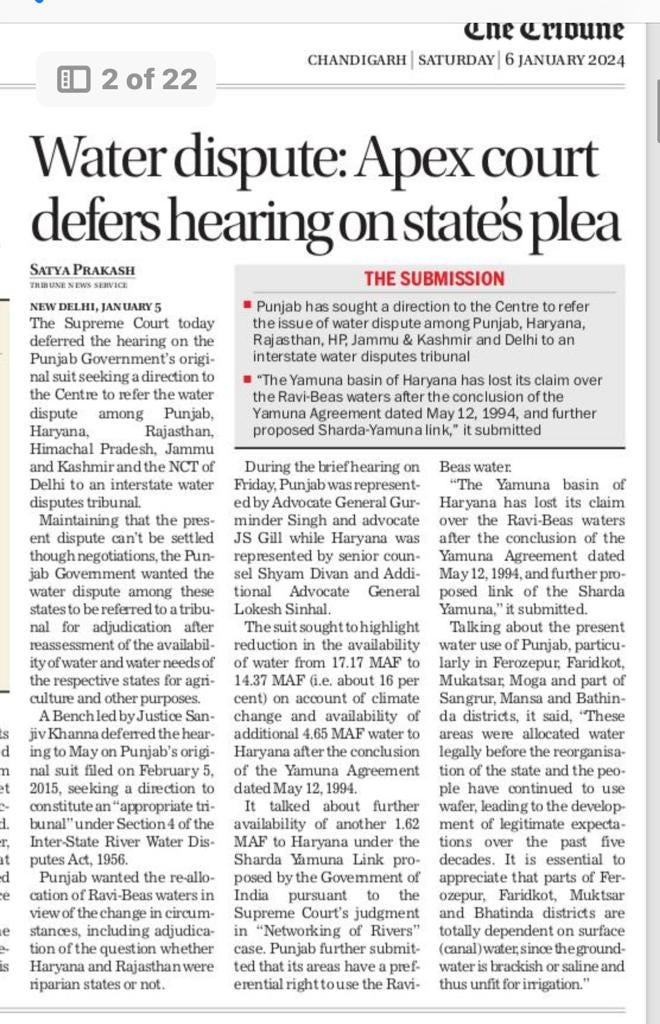Punjab's Plea in the Supreme Court: Set Up a New "River-Waters Tribunal" before Pushing SYL Construction
Strategic Approach to River Waters Dispute: Advocating for a New Tribunal Under the Inter-State River Water Disputes Act, 1956 Before Pushing SYL Canal Construction.
Introduction to the Strategic Legal Move
The Punjab Government's initiative to expedite its suit of original jurisdiction, which it had filed in the Supreme Court nearly a decade ago on 5th February 2015, concerning the river waters dispute, is a commendable and correct course of action. The Supreme Court adjourned the matter to May, 2024, after a brief hearing on 5th January, 2024 (see The Tribune snapshot below).
Punjab has consistently maintained, especially since the interim Award of the Eradi Tribunal—which notably never gave a final Award—that the availability of Ravi-Beas waters has significantly diminished. Thus, it reasonably argues that before proceeding with any further action, including the implementation of the decree dated 15th January 2002, awarded by the Supreme Court in favour of the State of Haryana— that mandated the construction of the SYL Canal— the Central Government ought to be directed to relegate the river waters dispute to a newly established tribunal under the Inter-State River Water Disputes Act, 1956. This is to ensure a fair re-assessment of the inter se shares of the riparian states.
The Legal Context and Punjab’s Consistent Stand
It is significant to note that despite the Punjab Government's formal request to the Central Government to refer the dispute to a new Tribunal since 2015, there has been a marked absence of any tangible action. This lack of response reasonably bolsters Punjab's rationale for bringing the matter before the Supreme Court, in exercise of its original jurisdiction, given that the issue is a dispute inter se the States of the Union and the Union Government itself.
The Supreme Court's decision to adjourn the matter until May 2024 serves to effectively preclude the contentious river water issue from being exploited as a political instrument in the lead-up to the upcoming Lok Sabha elections. Nonetheless, this also sends a powerful political and electoral signal to the populace of Punjab: the Punjab Government, under the leadership of Chief Minister Bhagwant Mann, is committedly striving to protect the interests of both Punjab and its farmers.
Halting Ineffective Negotiations and Assessing the Merits
This strategy also temporarily suspends the so-called mutual negotiations between the states, facilitated by the Central Government, which, aside from rekindling divisive issues, had virtually no chance of yielding a resolution.
Regarding the merits, the dispute's history provides only a slender ray of hope, especially due to the acts of omission and commission by Punjab's extant leadership, which left scant leeway for constitutional courts to adjudicate in its favour. The Supreme Court had previously dismissed a similar civil suit of original jurisdiction filed by Punjab (No. 1 of 2003, dated 13th January 2013) on 4th June 2004. Haryana maintains that the Supreme Court has conclusively settled the matter with its decree of 15th January 2002 in its favour, including the dismissal of Punjab's review application on 5th March 2002. This decree separates the issue of river water availability or its inter se allocation among the stakeholder states from the construction of the SYL Canal. The Supreme Court has determined that, regardless of the claimed reduction in water availability, the SYL canal should be constructed in accordance with the agreed shares delineated in various inter-state agreements and the Eradi Tribunal Award and any minor adjustments can follow.
The Potential Impact and Looking Ahead
A positive outcome of the latest development is that it is likely to push back Haryana's application for the execution of the crucial 2002 Supreme Court decree. Observing the Central Government's position in this contentious and potentially explosive dispute will be particularly interesting, especially with the Haryana Vidhan Sabha elections on the horizon.
While the immediate risk of the issue sparking fresh farmers' agitations might have receded until May 2024, readers would benefit from perusing an article I penned a few months back, offering an exhaustive history of the SYL Canal dispute. The link below leads to this detailed yet self-contained article, necessitating at least 15 minutes of uninterrupted reading for thorough comprehension and appreciation1.
Do you have any questions?
Should you have any questions or queries, we are dedicated to providing responses to the best of our ability. We encourage readers to submit their inquiries in the form of questions in the comment section following this article. For the moment, however, it appears that the Punjabi farmer may enjoy a brief period of relief, a situation arguably as favourable as could be hoped for given the circumstances.
The River Waters Issue (SYL): A Chronicle of Continuous Injustices against Punjab
Punjab's Painful Odyssey: From Partition to River Rights The story of Punjab, the land of five rivers, is deeply etched with the twin narratives of bounty and betrayal. Its rich tapestry, woven over millennia, has experienced significant ruptures in the not-so-distant past. The cataclysmic event of the Partition in 1947 dealt a crippling blow to the stat…







